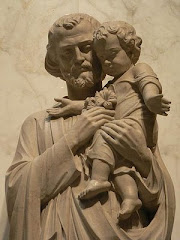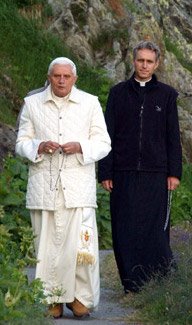The following is an excerpt of the letter His Holiness John Paul II address to the OCarm and OCD families in March 2001.
-o-
Generations of Carmelites, from the beginnings up to today, in their journey towards the "holy mountain, Jesus Christ Our Lord" (Roman Missal, Collect for the Mass in honour of the BVM of Mt. Carmel, 16 July), have sought to model their lives after the example of Mary. For this reason, contemplation of the Blessed Virgin flourishes in Carmel and in every soul moved by a tender affection towards Her who is our most holy Mother.
[A] contemplative attitude of mind and heart brings us to admire the Blessed Virgin’s faith and love, by which She already possesses what every faithful Christian desires and hopes to be within the mystery of Christ and the Church (cf. Sacrosanctum Concilium, 103; Lumen gentium, 53). For this reason, Carmelites justly have chosen Mary as their Patroness and spiritual Mother and keep her always in mind, She who is the Most Pure Virgin and who leads all to the perfect knowledge and imitation of Christ.
In this way a spiritual intimacy develops in which the communion with Christ and with Mary is always growing. For the members of the Carmelite Family, Mary, the Virgin Mother of God and Mother of all people, is not only a model to imitate, but is also present as Mother and Sister in whom one can confide. Rightly St. Teresa of Jesus wrote, "Imitate Mary and consider how great she must be and what a good thing it is that we have her for our Patroness" (Interior Castle, III, 1, 3).
This intense Marian life, which is expressed in trusting prayer, in enthusiastic praise and in diligent imitation, leads us to understand that the most genuine form of devotion to the Most Holy Virgin, expressed by the humble sign of the Scapular, is the consecration to her Immaculate Heart (cf. Letter of Pope Pius XII, Neminem profecto latet [11 February 1950: AAS 42, 1950, pp. 390-391]; Dogmatic Constitution on the Church Lumen gentium, 67). Therefore in each one’s heart a communion and familiarity with the Holy Virgin grows, "as a new way of living for God and continuing here on earth the love which Jesus had towards his mother Mary" (cf. Sermon at the Angelus, in Insegnamenti XI/3, 1988, p.173). In this way, according to the expression of the Blessed martyr Titus Brandsma, we are profoundly united with Mary, the Theotokos, becoming like her, bearers of the divine life: "The Lord sends an angel also to us…… we also must receive God in our hearts, carry him in our hearts, nourish him and let him grow within us so that he is born from us and lives with us as Emmanuel, God-with-us (From the talk of Bl. Titus Brandsma to the Mariological Congress of Tongerloo, August 1936).
This rich Marian heritage which Carmel possesses has become over time a treasure for the whole Church, through the spread of the devotion of the Brown Scapular. By means of its simplicity, its relatedness to ordinary human life and its connection with the role of Mary in the Church and the whole of humanity, this devotion has been profoundly and whole heartedly received by the people of God, so much so as to be remembered in the memorial of 16th July, which is in the liturgical calendar of the Universal Church.
The Scapular represents a synthesis of Marian spirituality. It nourishes the devotion of believers, making them sensitive to the loving presence of the Virgin Mother in their lives. The Scapular is essentially a "habit". Those who receive it are aggregated or associated in varying degrees with the Order of Carmel, which is dedicated to the service of Our Lady for the good of the whole Church (cf. Formula for the imposition of the Scapular, in the "Rite of Blessing and imposition of the Scapular", approved by the Congregation for Divine Worship and the Discipline of the Sacraments, 5/1/1996). Those who put on the Scapular are introduced into the land of Carmel so that they might "eat its abundant fruit" (cf. Jer. 2,7), and experience the tender and maternal presence of Mary, as they commit themselves daily to put on Christ and to make his presence manifest in their lives for the good of the Church and of the whole of humanity (cf. Formula for the imposition of the Scapular, cit).
There are two truths which the sign of the Scapular brings out: on the one hand, there is the continuous protection of the Blessed Virgin, not only along the pathways of this life, but also at the moment of passing into the fullness of eternal glory; on the other hand, there is the awareness that devotion towards Our Lady cannot be limited to the occasional prayer in her honour, but must become a "habit", that is a permanent way of Christian living, made up of prayer and the interior life, frequent recourse to the Sacraments and the concrete exercise of the corporal and spiritual works of mercy. In this way the Scapular becomes a sign of "covenant" and of reciprocal communion between Mary and the faithful. It expresses in a concrete way the gift, which Jesus, while hanging on the cross, made of his Mother to John, and through him to us. It also gives expression to Jesus’ commitment of the beloved disciple and us to Her, who thus became our spiritual Mother.
The witness of holiness and wisdom of so many Saints of Carmel, who all grew up under the shade and the care of their Mother, is a splendid example of this Marian spirituality, which forms us and configures us to Christ, who is the first born among many brothers and sisters. For a very long time I too have worn the Carmelite Scapular! Because of the love which I have for our heavenly Mother, whose protection I experience constantly, I wish that this Marian year be an aid to all the religious in Carmel and the faithful who venerate her, to grow in their love of Her and to radiate in the world the presence of this Woman of silence and of prayer, who is invoked as the Mother of mercy, the Mother of hope and of grace.
With these wishes, I gladly impart my Apostolic Blessing to all the friars, nuns, sisters and lay people of the Carmelite Family, who work so hard to spread among the people of God true devotion to Mary, Star of the Sea and Flower of Carmel!
© L'Osservatore Romano
Editorial and Management Offices
Via del Pellegrino
00120 Vatican City
Europe


























